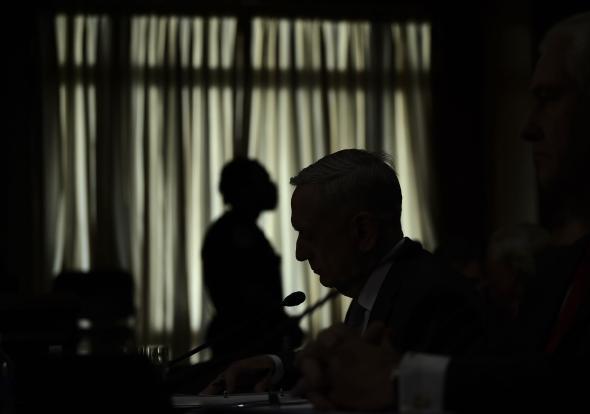It’s rare these days to come across a blockbuster news report that isn’t, in one way or another, about the Trump administration, but a recent New York Times story manages to be just that. The article—enticingly titled “Glowing Auras and ‘Black Money’”—discusses a shadowy initiative within the Pentagon that set out to investigate UFOs. As Daniel Politi noted in Slate over the weekend, it’s hard to say what, if anything, the program found. Nevertheless, the mere existence of the initiative has generated a flurry of attention online, with many glomming on to a second NYT story about an unexplained sighting and others fixating on reports of a Las Vegas facility that stores mysterious alloys.
There are, of course, reasons to be skeptical about the reported $22 million in funding that went to the program. Key among them is surely that, according to the New York Times, “Most of the money went to an aerospace research company run by a billionaire entrepreneur and longtime friend of [Harry] Reid’s, Robert Bigelow, who is currently working with NASA to produce expandable craft for humans to use in space.” While the story suggests that Bigelow is a true believer, it’s still disquieting to learn that the program funneled cash to an ally of the senator who pushed for it in the first place.
That said, in the larger scheme of U.S. defense funding, $22 million is practically a rounding error. Like the military’s investigations into psychic warfare, which reportedly carried a similar price tag, it seems reasonable enough to at least look at unexplained phenomena, even if those inquiries fail to generate actionable information. Whether or not they have terrestrial origins, these supposed wonders are surely worth examining, if only because they might present a real security risk. It’s certainly not the worst thing that the Department of Defense could do with its massive budget.
But if this dark money really is meant to secure the homeland—and let’s just suppose, for now, that it is—it still might be put to better use. If the available evidence even begins to suggest that intelligent aliens are really capable of visiting us, we probably shouldn’t be dedicating our resources to chasing down their exploratory craft. To the contrary, if we believe there’s even a chance they’re coming, we should be doing everything we can to hide from them.
Assuming that there are aliens out there—and that they’re technologically advanced enough to cross the massive chasm of space that separates us—it’s unlikely that they’d see us as anything but insects. Though they might not do so maliciously, their first response to contact might be to send in the exterminators. In its most cynical form, this premise has come to be associated with the work of Chinese science fiction writer Liu Cixin. Here’s how Ross Andersen lays out Liu’s concerns in a recent article for the Atlantic:
No civilization should ever announce its presence to the cosmos, [Liu] says. Any other civilization that learns of its existence will perceive it as a threat to expand—as all civilizations do, eliminating their competitors until they encounter one with superior technology and are themselves eliminated. This grim cosmic outlook is called “dark-forest theory,” because it conceives of every civilization in the universe as a hunter hiding in a moonless woodland, listening for the first rustlings of a rival.
Many others share similar worries, even if they don’t fear that our interplanetary others would be actively predatory. In a Slate article from 2015, Dan Falk described science fiction writer (and planetary scientist) David Brin’s objection to initiating alien contact: “He points to the history of our own planet, in which encounters between cultures of greatly differing technological sophistication rarely go well.” Famously, terrestrial pathogens beat back alien invaders in The War of the Worlds. If Brin is right, however, even a well-meaning visitor might accidentally destroy our entire biome.
That said, if the aliens are already here—and there plenty of reasons to challenge evidence for that contention—it may already be too late to hide. So long as the government is committed to fiscal boondoggles, however, we should hope that they’re focused on the ones most likely to keep us safe. Where aliens are concerned, dark money is probably fine, but going dark might be just a little better.
